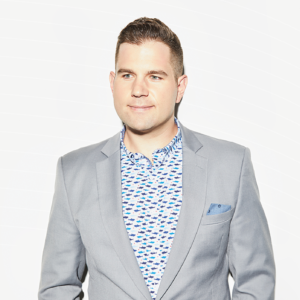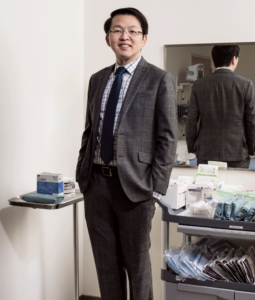Dr. Darren Brenner and Dr. Winson Cheung are studying big data to improve care for cancer patients across Alberta

Dr. Darren Brenner
Dr. Darren Brenner has done the math. He knows the chances of him walking through the Calgary Cancer Centre doors are high. Not as a doctor, but as a patient one day. He wants to make sure when he—or any other Albertan—is treated for cancer, his health-care team has the best possible data at their fingertips to predict the best outcomes.
Brenner, Dr. Winson Cheung and a team of clinicians and data scientists at the University of Calgary have positioned the city as a major hub for health outcomes research and real-world evidence generation. At its simplest, they are trying to improve patient care by understanding the gaps in screening and treatment as well as in the health-care system. To accomplish this, big data research that intersects with healthcare policy and industry becomes important.
“Data are only useful if they are used to answer the right questions and if they are analyzed in the right way. Because of this, we have developed a team of clinicians interested in outcomes research and big data in the province. This level of clinician engagement is unique yet essential to ensure that our data are leveraged to address the most high priority clinical issues.” says Dr. Winson Cheung.

Dr. Winson Cheung
Using data coupled with artificial intelligence and machine learning is important to improving patient outcomes across many types of cancer. For instance, in Brenner’s ACCORD project, they used a risk prediction model to determine who will continue treatment for early stage cancer, which can be used to identify who to focus on in terms follow-up or who to approach about different treatment options.
The goal of the future Calgary Cancer Centre is to build a learning cancer care system with the proper tools, teams, and systems so that the data being collected can immediately change the treatment for the next person to ensure it’s the right treatment, for the right person, at the right time.
“If you’re collecting the right data, it can be used to make better predictions and improve care,” says Brenner. “It improves treatment and care for the next patient, because the system learns from every patient who came before them.”
The Calgary Cancer Centre campaign is a once-in-a-generation opportunity. To excel at data-driven cancer care, you need good infrastructure, talented staff to ensure data integrity, and the right data to be collected. “To be successful, you need a learning care system like the one we will set up,” says Brenner, adding it can be done in pieces but this would take longer and won’t achieve the same impact. “If we want to think big, we can only do that because of that building going up right now that will allow us to have the right people in the right place.”
Funding, including philanthropic dollars, is key to setting up Alberta as leader in using high quality data to drive outcomes. “A learning health system is visionary and transformational,” says Brenner. “We need philanthropy to make this successful and that requires an investment. For instance, Alberta is a leader in cancer prevention because we have traditionally invested in that area. Investing in health outcomes research in the proper way will let us do it faster and with greater impact.”



